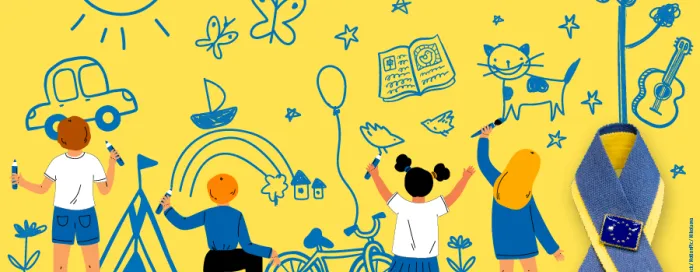"It's not about the support of the European countries to Ukraine, it's not about the support of the European institutions to Ukraine. It's about cities, regions and simple people in these cities and regions showing that we are still there for Ukrainians. That Ukrainians are not forgotten."
This is how Mikko Aaltonen, Member of Tampere City Council, puts in his words the idea behind organizing summer camps for children from Ukraine.
As the war in Ukraine is ongoing and Ukrainians fear that the war becomes a new normal, progressive local and regional authorities across the European Union show solidarity in action to underline that there is no war fatigue.
"The support comes from the people, and for us it's very important to underline this. It's not forced by the official authorities. It's just there. Our local communities are very strong in this solidarity with Ukraine even after 1,5 years."
Tampere was a twin city with Kyiv, Ukraine's capital, since the mid-50's. And it's the second summer that Tampere, the most populous inland city in the Nordic countries, organizes a summer camp for kids from the war-torn Ukraine.
This year these are mostly teenagers.
The camp is "a very traditional Finnish summer camp", Aaltonen says.
It's in the countryside with a lot of activities: sports, art, swimming, games etc. And what is interesting – the phone is taken away.
"We understood that Ukrainian kids are always looking in their phones, as they constantly follow the news, follow the situation at home. But we want them to take part in the activities, interact with other kids, make contacts, make friends. So the pragmatic decision was to take the phones away."
And it turned out to be useful not only for Ukrainian children.
"Integrating Ukrainian children into Finnish groups and letting them build friendships with each other is excellent peace education for Finnish youngsters, as a side effect," Aaltonen says.
"Ukrainian participants from the war zone are not the only ones who profit from the camp project but it also makes the news about the terror in Ukraine more concrete to the Finns, and us willing to support our friends during difficult times that are not going to be over in near future."
It's a "symbolic support", he underlines.
"Although we were only able to help a small number of young people, we felt it was important to do so".
The children were happy with the camp and delighted with the experience, but also a little wistful when leaving behind many Finnish friends.
What is needed now to encourage further action is EU financial support.
Based on the Tampere experience, the financial conditions should not be too restrictive in the conceptualization of camp activities, as there are likely to very different contexts.
Apart from camp fees, travel and accommodation costs are the main cost items.
"We want to organize more camps like these. We understand that we will need more in the future, as we don't know when the war will end," Aaltonen says.
"But it's so important to show these children that we care about them, we care about Ukraine, that they have friends in Finland. And I hope that one day in the future they will look back and remember that period of support in the hardest times. They will remember people who supported them. They will remember the town that supported them. They will remember Tampere."
Find out more about summer camps for Ukrainian children initiative here.
